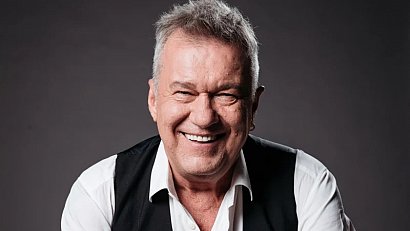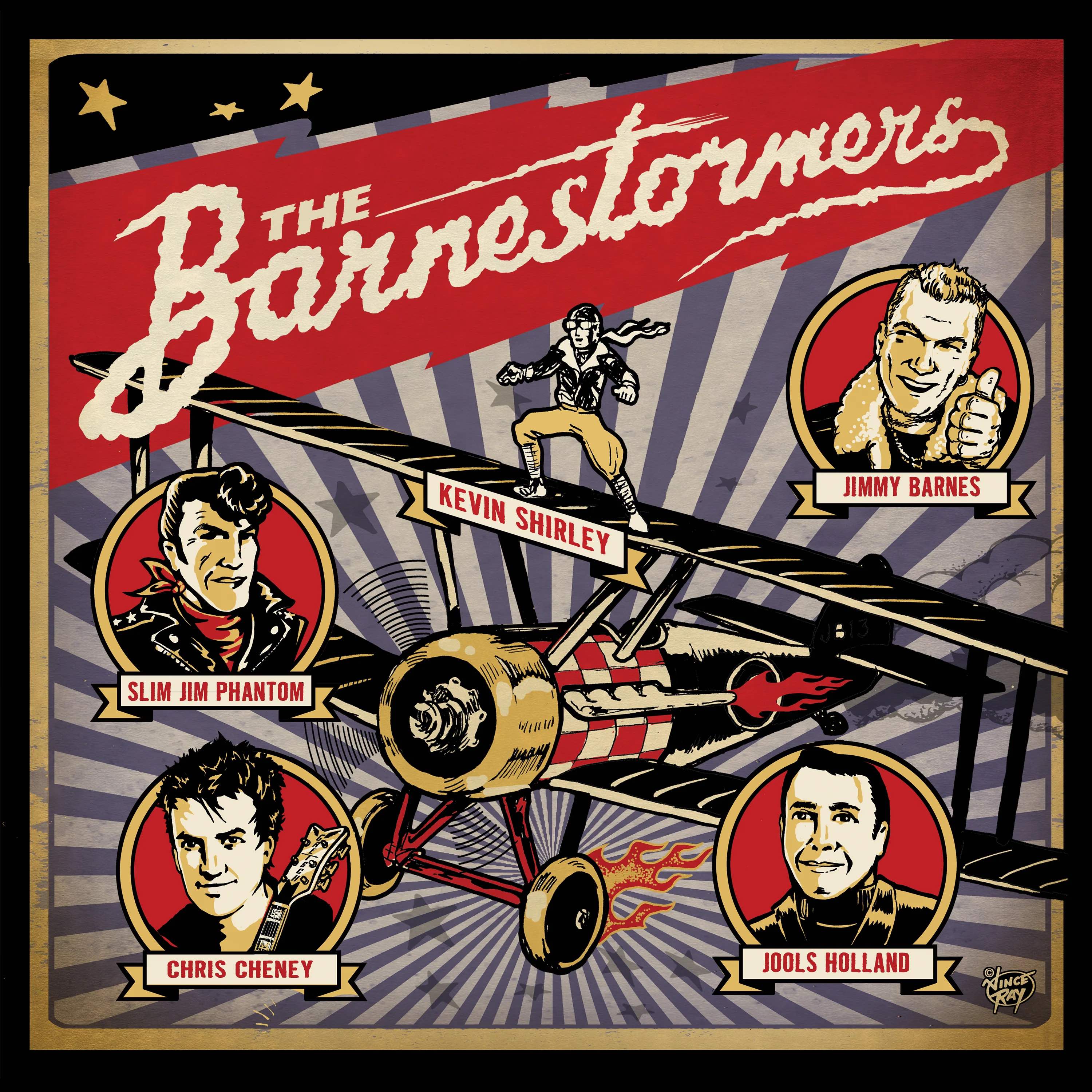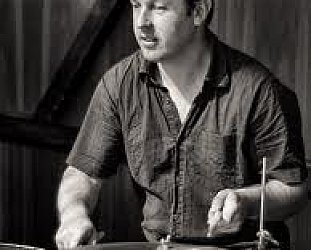Graham Reid | | 6 min read

With the physique of a Clydeside welder and laughter-filled lungs like industrial bellows, Jimmy Barnes enters the room, a combustable ball of electric enthusiasm.
It's late March and he's in Auckland to ostensibly talk up his new album Barnestormers, recorded remotely during Covid isolation with fellow Barnestormers pianist Jools Holland (in London), Stray Cat's drummer Slim Jim Phantom in Los Angeles, Australian bassist/producer Kevin Shirley and former Living End guitarist Chris Cheney.
It's an enjoyable rockabilly record which Shirley seamlessly welded together after each player laid down their parts and to everyone's credit it sounds like they're all in the same room.
That's the topic, but the former frontman for the seminal Australian rock band Cold Chisel -- now chest-deep into a long solo career -- is just back from five weeks of R'n'R in Thailand with his wife of more than 40 years, Jane, and the family (whom he mentions as if we've been round for backyard barbies).
 He's so energised questions are simply a key in the ignition.
He's so energised questions are simply a key in the ignition.
So what does he do when he's not being “Jimmy Barnes” and is just Jimmy the 67-year old husband, father and grandfather?
Turns out he's writing another book. So after his autobiographical Working Class Boy and Working Class Man this would be . . . Working Class Pensioner?
“Nah, he laughs, like gravel down a drainpipe. “It's fiction.”.
And – contrary to most authors who superstitiously won't reveal the work in progress – away he goes with his plot about Scottish witches and ghosts.
Although Barnsey – as he is familiarly known – left Glasgow more than 60 years ago the accent remains and he's still a Scot at heart, his new book – about two-thirds done – might be grounded in medievalism but there are also more contemporary elements.
“It's loosely based on my life, but even more of a horror story than mine was, “ he rattles. “It starts around the 60s in Scotland when I was there but then there are these vindictive ghosts and it goes back to the 16th century.
“But it's also in the trenches in World War I and ends up in Adelaide.”
Whatever its about, Barnes is enthusiastic and has diligently done his research. He speaks of the Reformation, the killing of more than 500 women suspected of having the second sight or healing with herbs (“it was all about controlling women”) and of Thomas Aitkenhead, “the last person hung in Britain for blasphemy” who he says was walking down Edinburgh's Royal Mile and made a joke about the doors of the Protestant church being locked.
“He said he'd rather be in Hell, at least the doors would be open and it would be warm when you got in. He was hung for blasphemy. He's one of the anchor characters.”
Barnes is serious about enjoying the discipline of writing “because I've never had discipline in my life, although I did turn up for the job. Although some days I wished I hadn't”.
Being in Thailand away from the phone, requests to do interviews, radio or charity events meant he could do two hours of physio and workouts in the morning, go the markets and eat then come back and sit and write for six hours.
A similar obsessive energy and singular focus he has brought to his music career where – especially in Cold Chisel – he adopted a take-no-prisoners approach to performance.
“When I wrote Working Class Boy and Working Class Man I knew I could write and riff, knew I could write fiction and I've really enjoyed the process.
“In Thailand I could just sit and write and stay in the moment.
“I might not use any of it but it's like any job, the best thing you can do is turn up. If you sit down and write you're going to write something eventually.”
And speaking of the job . . . Barnestormers – that's the goal for the next one, he has yet to meet Holland in person – and a tribute to music from a bit before his time but which influenced early rock'n'roll.
“Chris and Slim Jim knew the dark side of rockabilly a lot more than me but I researched it of course, as I do. It's hillbilly music and hillbillies were Scots who went to Kentucky so I could connect with that.
“I like that rockabilly was one of the steps to rock'n'roll, where country met blues met swing.”
Although he grew up with the Rolling Stones and Rod Stewart “who lent toward American music” his favourite singers were rock'n'rollers like Little Richard, Elvis Presley and Jerry Lee Lewis but that early form of rockabilly was always there, “that music which has the potential to set a room on fire, the minimalists sound, and clean twang of the guitar players which cuts like a knife”.
His older brother used to play it but there was a particular epiphany in the Seventies when Cold Chisel was on the road, eight shows a week and driving to gigs across the country in a Toyota van.
“I came out of a gig in Melbourne and about to drive 12 hours to Queensland and some guy at the backdoor handed me a cassette and said, 'Have a listen to this'. It was two sides of Johnny Burnette's Rock and Roll Trio and I loved it.
“It lived in the car, so there's a lot of Johnny Burnette's influence on this record because when Chris and I spoke about it the first thing we thought about was Burnette's Lonesome Train”.
 Also on Barnestormers is their take on Bill Haley's odd 13 Women, originally the A-side a single until a DJ flipped it over and found Rock Around the Clock.
Also on Barnestormers is their take on Bill Haley's odd 13 Women, originally the A-side a single until a DJ flipped it over and found Rock Around the Clock.
“That's one of my favourite songs, I used to sing that all the time as a kid. And [Roy Orbison's] Working for the Man, a great song and I think the vocal on that is one of the best i've ever done.”
There's also the much-covered Australian classic Real Wild Child by Johnny O'Keefe: “I worked with him, I didn't get on well, we nearly had a fight, but I have so much respect for him because as a frontman, he literally kicked down doors so people like me could come through.”
When Iggy Pop – “outrageous, unique, very articulate, smart and passionate” – covered it “he made it more rock but ours is closer to Jerry Lee Lewis' version”.
Barnes says the embryo of the idea for the album started in New Zealand in 1990 when he toured with rockabilly revivalists the Stray Cats and he'd watch from the side of the stage. He became close friends with the band's singer/guitarist Brian Setzer and drummer Slim Jim “who was good mates with Chris and Jools”.
They'd long talked about making a rockabilly album and Covid provided the prompt, “although it's like garage music, you have to be on one room like Sun Studio, yet Kevin managed to make it sound real and live”.
“I thought it could be too loose or too sterile, it has to be a bit loose but the enthusiasm meant when I came to do my vocal it felt like I was in the room with them, it was swinging. Rockabilly has got to roll more than it rock, it's got that country swing too”.
The album also brought Barnes back together with Cold Chisel's songwriter Don Walker, whose rockabilly song Johnnys Gone they covered. It had appeared on one of Walker's albums as Catfish “so he said no one had heard it”.
There is also their co-write Land of Hope and Glory which appeared on the 2009 Chisel reunion album Blood Moon which Barnes felt needed to be more swinging and sleazy “and Jools' piano playing took it off the charts”.
“It's dark, angry and anti-American. I love so much American culture but when we first went over with Chisel in about 79 it was just all these big cogs turning and nothing about feel for the music
“I've felt uncomfortable about that ever since, which is ironic because everything I do is based on American culture, like rockabilly”.
In a freewheeling and digressive conversation he becomes almost inarticulate with anger about American politics and we inevitably come to his health: he's had open heart surgery, a bad back, knee operations and a skirmish with Covid.
He's increasingly aware of mortality and recently sang a moving Bonnie Bonnie Banks of Loch Lomond in tribute to the late chef Jock Zonfrillo, his friend and fellow Glaswegian.
“I've grown a lot over the years, I was always on tour but then I'd go to the mountains of Northern Thailand and meditate with monks. Then I'd go on tour and go crazy again.
“But finally, as happens in your 60s,” he says, rattling the gravel once more, “the penny dropped about how to keep my sanity and health”.
"Yeah, I've grown a lot over the years, I was always on tour but then when I wasn't I'd go to the mountains of Northern Thailand and meditate with monks for four weeks.
“Then I'd go on tour again and go crazy,” he laughs.
“It was a juggling act, I went to India with Deepak Chopra and I learned a lot of things . . . and finally, as happens in your 60s, the penny dropped about how to keep my sanity and my health”.
And with that Jimmy Barnes, all coiled energy and enthusiasm, shakes hands and heads off to talk enthusiastically to radio about . . . rockabilly, his book, family, politics?
Wherever the mood takes him it would seem.
.
You can hear this album at Spotify here





post a comment